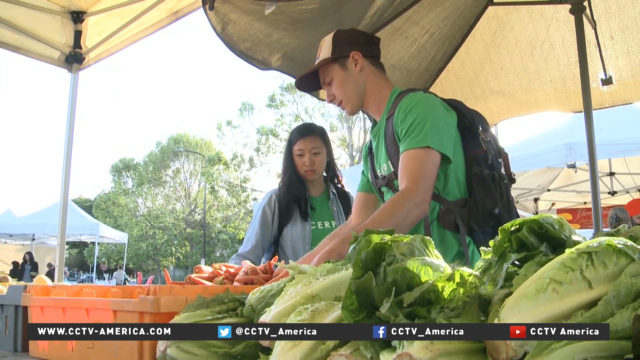About a third of all food produced every year is wasted or lost. In the U.S., one out of every five fruits and vegetables grown will never make it to a grocery store because it doesn’t fit cosmetic standards. In response, a new crop of startups is out to prove that just because something isn’t beautiful, doesn’t mean it’s not valuable.
CCTV America’s Mark Niu has the details.

“You have to have your table be looking full in order for people to come by and actually buy from you, so we always have leftovers,” farmer Marsha Habib of Oya Organics said as the Berkeley, California farmers market came to a close for the day.
At another market stand, Farmer Efren Avalos showed us what didn’t sell, including some artichokes that had been hit by frost.
“People gonna say it’s not good because it’s cracked already, but it’s still good,” Avalos said. “If you cut it off, the little piece, the rest will be perfect.”
Perfect for the startup Cerplus, which swooped in to cut a deal for ugly produce. The company takes unwanted food and lists it on their online marketplace.
“I saw firsthand what was being wasted towards the end of the market. I would ask farmers what they were gonna do with it and they said we’re probably just gonna be composing it,” Zoe Wong, Cerplus cofounder and CEO, said. “It was just because the farmers didn’t have alternative channels to be selling their surplus.”
Farmers get paid once their food is sold to companies that make everything from juices to soups to baby food. Plenty of buyers come from the food services industry, like the Fog Harbor Fish House, whose chef masterfully beautifies the produce.
“Half the price. — a pretty good deal,” Fog Harbor Fish House executive chef Adolfo Soto said. “It’s basically our job to make everything look beautiful, it’s like a beauty shop. We trim, we cut, we shave, we add colors, and it looks pretty good in the end.”
Does it taste any different?
“It’s exactly the same,” Soto said. “A broccoli is a broccoli. A zucchini is a zucchini.”
Other market opportunities include organizations like Imperfect Produce, where workers pack more than 2,000 boxes that will be delivered to homes each week where consumers are more than happy to welcome ugly produce into their homes.
In operation for less than a year, Imperfect Produce’s model of finding ugly food from farmers and selling it directly to consumers is growing by 50 boxes a week.
“We think all food is beautiful, anything grown, fresh, edible for human consumption,” Evan Hazelett of Imperfect Produce said. “All that stuff is beautiful. There’s just been this perception born out over a couple of decades in the U.S. – the bigger, the more beautiful – and we are a wealthy nation so we can afford to waste food, which is very sad even as one in seven Americans go hungry.”
Imperfect Produce guarantees its boxes to be at least 30 percent cheaper than what you would buy at a grocery store.
“I appreciate the fact that they’re not letting perfectly good food go to waste,” one customer said.
Imperfect’s produce will soon be sold at local Whole Food’s Market stores, and it regularly cuts deals with Cerplus.
But it will take these players and many more to take a sizeable bite out of a nationwide problem — as the U.S. currently spends $218 billion a year growing and disposing of food that never gets eaten.
 CGTN America
CGTN America

